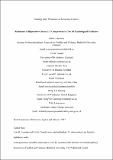Files in this item
Resistance in repressive contexts : a comprehensive test of psychological predictors
Item metadata
| dc.contributor.author | Ayanian, Arin | |
| dc.contributor.author | Tausch, Nicole | |
| dc.contributor.author | Acar, Yasemin Gülsüm | |
| dc.contributor.author | Chayinska, Maria | |
| dc.contributor.author | Cheung, Wing-Yee | |
| dc.contributor.author | Lukyanova, Yulia | |
| dc.date.accessioned | 2020-06-02T15:30:05Z | |
| dc.date.available | 2020-06-02T15:30:05Z | |
| dc.date.issued | 2020-07-02 | |
| dc.identifier | 267778608 | |
| dc.identifier | 386c422f-5683-47d6-90cb-1fe7f42bcd6f | |
| dc.identifier | 85087486676 | |
| dc.identifier | 000634593300004 | |
| dc.identifier.citation | Ayanian , A , Tausch , N , Acar , Y G , Chayinska , M , Cheung , W-Y & Lukyanova , Y 2020 , ' Resistance in repressive contexts : a comprehensive test of psychological predictors ' , Journal of Personality and Social Psychology , vol. Online First , pp. 1-28 . https://doi.org/10.1037/pspi0000285 | en |
| dc.identifier.issn | 0022-3514 | |
| dc.identifier.other | ORCID: /0000-0002-9471-0673/work/79917936 | |
| dc.identifier.uri | https://hdl.handle.net/10023/20035 | |
| dc.description.abstract | Empirical research on the social psychological antecedents of collective action has been conducted almost exclusively in democratic societies, where activism is relatively safe. The present research examines the psychological predictors of collective action intentions in contexts where resistance is met with significant repression by the authorities. Combining recent advancements in the collective action literature, our model examines the unique predictive roles of emotion (anger and fear), political identity consolidation and participative efficacies, politicized identification, and moral obligation, over and above past participation. It further investigates how these variables are shaped by perceptions of risks attributable to repression. Four survey studies test this model among protesters in Russia (N = 305), Ukraine (N = 136), Hong Kong (N = 115), and Turkey (N = 296). Meta-analytic integration of the findings highlights that, unlike in most current accounts of collective action, protesters in these contexts are not primarily driven by political efficacy. Rather, their involvement is contingent upon beliefs in the ability of protest to build a movement (identity consolidation and participative efficacies) and motivated by outrage at state repression, identification with the social movement, and a sense of moral obligation to act on their behalf. Results also confirm that risks attributable to state repression spur rather than quell resistance by increasing outrage, politicized identification, identity consolidation and participative efficacies, and moral obligation. The implications of these findings for models of collective action and our understanding of the motives underlying engagement in repressive contexts are discussed. | |
| dc.format.extent | 28 | |
| dc.format.extent | 1708296 | |
| dc.language.iso | eng | |
| dc.relation.ispartof | Journal of Personality and Social Psychology | en |
| dc.subject | Collective action | en |
| dc.subject | Efficacy | en |
| dc.subject | Moral obligation | en |
| dc.subject | Politicized identification | en |
| dc.subject | Risky contexts | en |
| dc.subject | BF Psychology | en |
| dc.subject | NDAS | en |
| dc.subject | BDC | en |
| dc.subject | R2C | en |
| dc.subject.lcc | BF | en |
| dc.title | Resistance in repressive contexts : a comprehensive test of psychological predictors | en |
| dc.type | Journal article | en |
| dc.contributor.institution | University of St Andrews. School of Psychology and Neuroscience | en |
| dc.identifier.doi | https://doi.org/10.1037/pspi0000285 | |
| dc.description.status | Peer reviewed | en |
| dc.identifier.url | http://doi.org/10.1037/pspi0000285.supp | en |
This item appears in the following Collection(s)
Items in the St Andrews Research Repository are protected by copyright, with all rights reserved, unless otherwise indicated.

